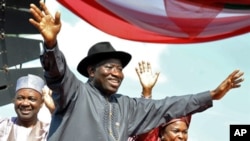Nigeria's electoral commission says it needs more time to register voters before January elections, raising prospects that the vote could be delayed.
Nigeria's Independent National Electoral Commission has no authority to change the timeline for legislative, presidential, and gubernatorial elections scheduled for January.
So chairman Attahiru Jega told the heads of political parties that the commission is doing its best to meet its legal obligations despite considerable obstacles.
"The fact that we have time constraints does not mean that the tasks at hand are impossible to accomplish within the existing time frame," said Attahiru Jega. "Instead, what it means is that there is a very limited margin to make modifications to timelines, particularly for critical deliverables."
For example, Jega says, if it takes five weeks instead of four weeks to deliver all the machines for voter registration, that would jeopardize the entire registration exercise.
"And the more we miss the timelines, the more difficult it becomes to adjust," he said. "Still, as a commission, we have repeatedly insisted that we shall work within the existing legal framework as contained in the 1999 constitution as amended and the Electoral Act 2010. We have also consistently said that the more time we have, the better the outcome of both the registration of voters and the 2011 elections would be."
Because it is not the commission's constitutional responsibility to change electoral timelines, Jega says lobbying for such an extension could open the commission to public suspicion.
"The question of fixing and changing election dates has been one of the major sore points of our electoral experience in Nigeria," said Attahiru Jega. "The degree of partisanship that has usually informed discussions of these issues is legendary."
So Jega says the commission has deliberately chosen to stay out of that issue. Until now.
"There is no point in delivering an electoral process the outcome of which will again be controversial and incredible,"he said.
Jega did not say how much more time the commission needs or whether that might delay January's vote. But he did make clear that the May deadline for transferring power must remain sacrosanct. He asked political leaders to work with lawmakers to consider all options for extending the electoral timetable so as to have the best vote possible.
Jega says the commission is making public its concerns about the electoral timeline because it wants to ensure the Nigerian people's ownership of the commission's work.
"We have always insisted that our actions will be transparent and that we should always seek the understanding and support of Nigerians in difficult times," said Jega. "Surely, this is one of such times."
Voter registration is currently scheduled to be held during the first 14 days of November.
Nigerian Electoral Commission Seeks More Time to Register Voters




